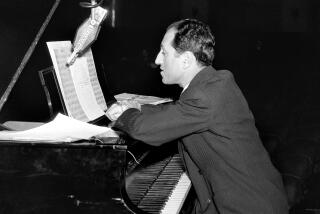Fred Steiner dies at 88; Hollywood composer created ‘Perry Mason’ theme
Television and film music composer Fred Steiner, creator of the bold and gritty theme for the “Perry Mason” TV series and one of the composers of the Oscar-nominated score for “The Color Purple,” has died. He was 88.
Steiner died of natural causes Thursday at his home in the town of Ajijic in the Mexican state of Jalisco, according to his daughter Wendy Waldman, a singer-songwriter.
One of the busiest composers working in Hollywood in the 1950s and ‘60s, Steiner also crafted music for “Gunsmoke,” “The Twilight Zone,” “Star Trek,” “Have Gun, Will Travel,” “Rawhide,” “Hogan’s Heroes” and other TV series.
Steiner said he wanted to create music for Mason, writer Erle Stanley Gardner’s legal-eagle lawyer, that projected two key facets of his personality: suave sophistication and the underlying toughness that allowed him to go head-to-head with the criminals with whom he often came into contact. The piece he came up with, titled “Park Avenue Beat,” pulsed with the power of the big city and the swagger of a beefy hero played to perfection by actor Raymond Burr.
“In those days, jazz — or in those days, rhythm and blues was the big thing — represented the seamier side of life,” Steiner told National Public Radio interviewer Nina Totenberg in 2002. “Don’t ask me why — that’s a sociological question.”
Frederick Steiner was born Feb. 24, 1923, in New York City, the son of violinist, composer and arranger George Steiner. He began playing the piano at 6 and took up the cello at 13. He received a scholarship to the Oberlin Conservatory of Music in Ohio, where he studied with composer Normand Lockwood.
His early jobs included composing, arranging and conducting music for New York City-based radio shows in the 1940s, and he was appointed musical director for the ABC radio series “This Is Your FBI.”
After moving west in 1947, he soon found film and TV work in Hollywood. Among his early assignments for CBS-TV were “Man Against Crime,” “The Danny Thomas Show” and “Gunsmoke.”
Steiner and the other members of Hollywood’s thriving musical community got together often, Waldman recalled.
“I remember them all very well, remember them playing chamber music at our house, remember Bernard Herrmann pounding on the piano, Elmer [Bernstein], Jerry Goldsmith, Earle Hagen, Henry Mancini, Leonard Rosenman, Nathan Van Cleave, it goes on and on,” she said.
In 1958 Steiner moved the family to Mexico City for 2 1/2 years after landing a job as director of an independent record company and was commissioned to create a library of music for Mexican television and government-produced documentaries.
“It was fantastic, really fantastic,” his daughter Jillian Steiner Sandrock told the Albuquerque Journal in 1996. “It contributed to my interest in traditional culture. There was poverty, but especially in the rural areas there was the traditional culture, and that was a way those communities stayed knit together.”
Steiner returned to Southern California in 1960 and resumed his career in Hollywood. He also continued his studies at UCLA and at USC, where he received a degree in musicology and where he later taught composition.
“Fred was one of those people who always made my work better,” longtime KUSC-FM host and film music aficionado Jim Svejda said Friday. “I remember one night when I introduced the Schoenberg Cello Concerto as being a work based on music ‘by that Baroque non-entity Georg Matthias Monn.’ The next day, Fred called and proceeded to gently rip me, explaining who Monn was, describing in detail all the wonderful things he’d written, patiently illustrating his importance in the subsequent development of Baroque music, etc.
“Keep in mind, Monn is a name that 99.9% of all music lovers have never even heard,” Svejda said. “From then on, I knew I had to watch myself because Fred might be listening.”
The serious, classical music aspect of Steiner’s life was a counterweight to the lighthearted character of one of his more widely recognized compositions, the jaunty Broadway-style theme he wrote for “The Bullwinkle Show” — a later incarnation of “The Adventures of Rocky & Bullwinkle” — and the charged-up, forthright Dudley Do-Right theme used in the series.
Steiner contributed music to more than two dozen episodes of the original “Star Trek” TV series, music that resurfaced in 1979’s “Star Trek: The Motion Picture” and, most recently, for “Star Trek New Voyages: Phase II.” He also provided music, although uncredited, for “Star Wars Episode VI: Return of the Jedi” in 1983.
Contrary to the stereotype in Hollywood, Steiner was known for his down-to-earth personality. “In a profession often marked with personality conflicts and frayed nerves,” film historian Tony Thomas wrote in 1991, “Steiner is notable for his even temper and affable nature. It is no exaggeration to claim him as one of the best-liked men in the film music community.”
In addition to his daughters, Steiner is survived by his wife of 64 years, Shirley; a sister, Kay Gellert; two grandchildren; and two great-grandchildren.
More to Read
Start your day right
Sign up for Essential California for the L.A. Times biggest news, features and recommendations in your inbox six days a week.
You may occasionally receive promotional content from the Los Angeles Times.




















































